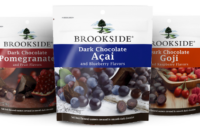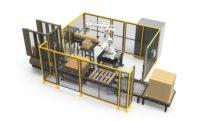
Marina Mayer, Executive Editor
When it comes to consumers, no two are alike. While one wants quality, the other wants quantity. While one seeks out better-for-you ingredients, the other is in search for the most eco-friendly packaging.
This may put some food manufacturers in a bind to please the every-consumer, but for companies like Ruiz Foods, there’s an art to staying ahead of the game.
“Every day, the complexity increases in our business. You can’t just sell the same box of macaroni and cheese,” says Brian Miller, senior vice president of supply chain for Ruiz Foods. “Consumers are quite different today and it’s almost as though we’ve become a restaurant. We’re developing new products all the time. Whether it’s out of boredom or something else, consumers demand more flavor and flair.”
That’s why Ruiz Foods, producer of frozen, hand-held entrees and snacks, remains flexible in its 42-acre, 260,000-sq.-ft. plant, and continues churning out as many as 200 distinct stock-keeping units (SKUs) for retail, foodservice and club store channels.
For starters, this 20-year-old plant dramatically retooled and reconfigured several packaging lines, discontinued several bag-in-box packages and other formats and converted as many as 12 different food packages to stand-up recloseable, zippered pouches for tamales, mini chimichangas and taquitos, among others.
“Many companies would have needed six to eight months to change production and packaging, yet we did it within 90 days,” notes Miller. “We’re definitely a ‘brand-driven’ facility with the same type of mindset and environment as a copacker. We have to be flexible and oriented toward customer service. We’re going to deliver to our sales and marketing plans, no matter what.”
The plant is also home to six production lines, 10 packaging lines, a raw materials warehouse, a tortilla bakery, production and a finished goods storage room. The plant runs 24 hours, six days a week, with 15-17 hours of production alternating with sanitation, preventative maintenance and food safety activities.
Making its mark
To be successful, Ruiz Foods needs to employ good people who can bring passion, dedication and diligence to the front lines. That’s why it helps to have a veteran workforce. For example, of the 1,650 employees, 511 joined the company 10 years ago and another 144 have 20 years of tenure. Since the Dinuba facility opened in 1990, Ruiz Foods has attracted hundreds of workers within a 40-mile radius, and has even employed two generations of families.
It’s these ongoing relationships that have helped Ruiz Foods reach some noteworthy achievements, Miller says.
“Eight or nine years ago, repetitive motion activities put us in a high-risk category for workers compensation,” says Miller. “Then we developed a program involving job rotations, job qualification standards, preventative injury exercises and other disciplines, so team members are doing various things throughout the week. Years ago, our injury index was seven or eight (injuries per business hour), which was comparable to the industry standard for a company our size. Today, we’re at an index rate of 1.5 and in our shipping and receiving area alone, we’ve accumulated more than 3,650 days (or 10 years) with no loss-time accidents.”
When it comes to food safety, Ruiz Foods takes extra measures to inspect raw materials coming and finished products going out.
“We handle allergens and high-risk ingredients such as chicken, beef, pork, cheese, eggs and other items,” Miller says. “Because of the high risks associated with adulteration or bacteria, we inspect at least 98% of all raw materials entering the plant. In 2010, we even exceeded that standard, even though we handle as many as 200 different product SKUs.”
Additionally, Ruiz Foods issues a quarterly bonus program with three parameters, says Miller.
“Our goals are 98% first-time quality, schedule attainment of 95% or better and no equipment damage inflicted by team members. We’re giving more [equipment upkeep] ownership to team members and believe in a system where 1,600 peers help each other achieve success. Last year, our factory’s average hit 99.5% for product ‘right first time.’ We also review first-time quality against a consumer complaints measure. For a factory our size―per millions of items produced,―the industry average is five or six pieces per million (drawing complaints). Our goal was 1.3 eaches per million and we achieved just 0.91 million.”
“Fresh-frozen” process
To produce the best-quality product, the folks at Ruiz Foods treat taquitos the same way a frozen vegetable plant handles beans―with one-on-one care.
“We are 100% self sufficient,” Miller notes. “This includes our own flour delivery system and a complete fresh tortilla bakery to how we blend our own spices and prepare all of our fillings on the factory floor within just a few hours of freezing. Even though our products are frozen, we ensure that each is ‘fresh-frozen,’ so when a consumer prepares it, it tastes as though it’s been cooked for the first time.”
At the time of the plant visit, Ruiz Foods was preparing chicken and cheese taquitos.
The pre-batch kitchen team members arrive at midnight to remove cheese and chicken from shipping boxes. These ingredients arrive at the cold mix room and are held at 40°F to ensure food safety and proper mixing consistency.
“Our products require lots of material handling because we don’t believe in ‘pump-in-place’ fillings,” says Miller. “We emphasize [ingredient] piece integrity, which is one way we differentiate ourselves with high quality.”
Following computerized formula print-outs, workers then add water, spices, green chilies and other vegetables. Once the mixture reaches proper consistency, it’s dumped into a mobile stainless-steel tote, which are staged in a chilled holding area (and sampled by quality assurance technicians) before entering the production room floor.
Two external flour silos feed flour (using an air conveyance system) into the plant on a batch-volume basis. Pre-set amounts of flour and metered water are released into one of four large, upright mixers. After the blend is created, the dough is transferred into proprietary tortilla equipment where it’s formed and cut. The tortillas then travel onward through a continuous oven, where they bake for seconds before exiting at the other end. Wire conveyors then allow the tortillas to cool slightly before employees remove, stack and stage them for subsequent use on the line.
Next, operators transfer filling mixtures into filling machines positioned beside each filling line. Once tortillas are placed on the production belt conveyor, they receive filling and are quickly folded and rolled via a proprietary process.
Rolled and filled tortillas then head into a continuous fryer, which cooks for approximately 30 seconds. Operators then check the newly created (now golden brown) tortillas before they travel into a spiral freezer.
Taquitos travel upward and exit the freezer in the second-story packaging room. Here, operators pack them in new stand-up, recloseable pouches, apply code date registration and feed them to automating casepacking lines. Ruiz Foods’ successful transition to stand-up pouch has officials considering even more new product and package applications, without expanding the plant’s existing factory footprint, Miller says. Team members also add their own outer case labels to track product in the plant’s adjacent storage freezer.
Each Ruiz production line is flexible enough to process as many as six to eight different items, Miller says. And, even as pallet loads ship out to Ruiz Foods’ third-party distribution network, Miller says he and Dinuba team members remain focused on the next load to come.
“We always challenge ourselves to come up with new ideas,” he says. “Our supply chain goal is to be the industry’s leader and ensure the best experience for any consumer buying frozen Mexican foods and flavorful frozen snacks.”
Regardless of how often or how drastically consumers’ demands change, Ruiz Foods holds the skills and qualities to continue being quick-change artists



